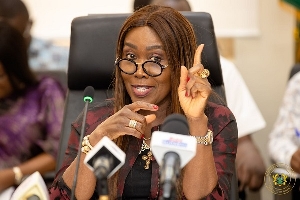- Home - News
- TWI News | TV
- Polls
- Year In Review
- News Archive
- Crime & Punishment
- Politics
- Regional
- Editorial
- Health
- Ghanaians Abroad
- Tabloid
- Africa
- Religion
- Election 2020
- Coronavirus
- News Videos | TV
- Photo Archives
- News Headlines
- Press Release
General News of Friday, 30 October 2009
Source: Dode Seidu
Govt and Dev't Partners strengthen partnership for budget support
A High Level Meeting between senior government officials and development partners has been held in Accra today. The meeting provided feedback to sector Ministers and Heads of Development Partner (DP) agencies on the conclusions and recommendations from a joint Government-DP retreat on multi-donor budget support (MDBS), held from 15-17 October in Koforidua. This meeting is the culmination of a series of events that started early this month to discuss the MDBS aid instrument.
Since 2002, the MDBS aid mechanism has contributed about $2bn in support of the Government’s budget activities, with a current yearly amount of approximately $300m. This has increased resources available to the Government of Ghana to implement its own budget according to its own priorities. The main aim of MDBS is to support the implementation of Ghana’s medium-term development plan, initially the Growth and Poverty Reduction Strategy GPRS and then later, its successor GRPSII. The MDBS group is made up of 11 development partners and is currently jointly chaired by Switzerland and the World Bank.
The High Level meeting was collectively opened by the Hon. Dr. Kwabena Duffour, Minister of Finance and Economic Planning, H.E. Mr. Nicolas Lang, Ambassador of Switzerland to Ghana and the World Bank Country Director Ghana, Mr. Ishac Diwan.
In his opening remarks, the Minister stated that ‘’the MDBS program, now in its sixth year of implementation…has been mutually beneficial’’ and that ‘’its success, sustainability and growth can be attributed to the commitment of both Government and Development Partners’’. He highlighted the importance of development support being ‘’flexible and predictable’’ and further added ‘’the need for Government to strengthen its ownership of the development agenda cannot be over-emphasised’’.
The eight recommendations that were presented at the High Level meeting arose from the discussions that took place at the October 2009 MDBS Retreat, where the Ministry of Finance and Economic Planning, the National Development Planning Commission and DPs were present. The dialogue was centred on the theme of the event ‘MDBS: A partnership for development results’, with particular focus on the issues of ownership, the level of policy dialogue and the flexibility of the MDBS instrument.
Specifically, it was recommended that main tool of the MDBS instrument – the progress assessment framework (PAF) – be modified to allow greater flexibility. The sector working groups that contribute significantly to the process would be co-chaired with DPs by Chief Directors to ensure strategic policy dialogue takes place, in addition cross-sectoral discussion would also be encouraged. The format of the Consultative Group meeting would be reviewed to allow for more high-level dialogue to take place throughout the year. Further, a matrix for assessing the performance of all development partners would be developed to come into force in 2010. The Minister of Finance and Economic Planning would continue to be responsible for the implementation of the PAF within Government. Communication to all stakeholders (Parliamentarians, CSOs, media) concerning MDBS and its relevant procedures would be actively pursued to initiate their involvement in the process.
The MDBS process has lowered transaction costs to the management of aid for both Government and DPs, increased the predictability of aid flows and allowed Government the flexibility of determining the manner in which this aid is spent. As a precondition to the use of the MDBS instrument, sound macroeconomic and public financial management performance needs to be observed. Other underlying principles include commitment to the achievement of the objectives of GPRSII and the MDGs, continuing peace and respect for human rights, the rule of law, democratic principles, and the independence of the judiciary; and good governance, accountability of the Government to the citizenry, and integrity in public life, including the active fight against corruption.
Entertainment









